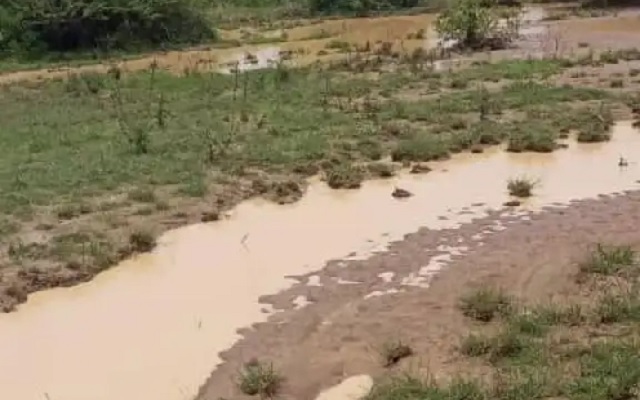
Buliisa, Uganda | THE INDEPENDENT | Augustine Katusabe, a farmer at Kasinyi village in Ngwedo Sub-county, Buliisa District stands in his farmland confused as to the next move out of poverty, after ‘man-made floods’ destroyed his crops.
Katusabe had taken to growing vegetables and fruits like watermelon, pumpkin and bananas as well as neem-trees, as he hoped to take advantage of the promising market created by the oil and gas market in the region.
His hopes were dashed when one morning he woke up to find his fields flooded by brown water and sand allover.
He is one of the many Bagungu farmers who say that their farming activities have been affected by the water from the nearby Tilenga Central Processing Facility (CPF) being constructed in the area by McDermott for TotalEnergies.
Another farmer, William Bamuturaki, explained that the CPF is being built in an area which once hosted several swamps and that when it rains there is more water than usual and this forced the collapse of the wall, according to Bamuturaki.
When the water subsides, it follows a newly-created stream through at least four villages, from Kasinyi through Kirama, Kigwera Northwest and Kigwera Southeast down to Lake Albert.
However, it dumps most of the sandy soils it comes with from the works site in the farmlands in the neighbouring villages, having broken through the gate.
Because of the sand, according to Bamuturaki, they have realized that nothing can grow on the area.
A visibly angry Margaret Nyakato, also a farmer in Kasinyi village appealed to anybody of help because, according to her, all efforts have fallen on deaf ears.
Speaking in Rugungu dialect, the 52-year old Nyakato said she had never in her life seen such destructive and terrifying floods, which are threatening their animals because they are now drinking dirty water.The animals cannot even cross over to the other side of the area for grazing because of the water, hence limiting the available pastures now.
Nyakato refutes the response by the owners of the CPF that that is a drainage route, reasoning that when they were buying the land this area was never included in the plans nor was it under those to be compensated for.
Several gardens, or former gardens, litter the area, but save for some trees, most other crops are either drying up of are already dry.
Ngwedo Sub-county was traditionally preserved for farming due to its cultivable and fertile lands.
The people of Buliisa usually reside in dryer areas with their animals, mainly cattle and goats, and go to places like Ngwedo for cultivation.Their main crop was cassava.
However, when they learnt that there was a new emerging market caused by the oil and gas industry, they decided to try their luck.
Bamuturaki says that in other areas, the crops are doing well.
Byakagaba Geoffrey, another resident says they have tried different authorities but have not got any help, adding that other local government officials like the RDC have been denied entry into the facilities to assess the claims and what is being done to address them.
He adds that even TotalEnergies officials have visited the affected areas and taken written complaints, but that nothing is being done, leaving their only hope in petitioning President Yoweri Museveni.
The environmental and social impact assessment done by the company in 2019 provides for mitigation, prevention and compensation for emergencies and effects on the environment arising from the activities of the oil and gas companies.
According to the agreements signed by the government and the companies, when there is an environmental incident like a leak or other disaster, the oil and gas company bears the responsibility, while the government may only come if to help stop the emergency.
In an earlier interview, the Petroleum Authority of Uganda, PAU, Legal and Corporate Affairs head, Ali Ssekatawa said the companies are training local residents who would be the first line of response in case of an emergency.
Gloria Sebikari, the Corporate Affairs Manager, when contacted, said there was an ongoing assessment by a field teams, saying the flooding is caused by the heavy rains.
“The water is from surface run off as a result of heavy rains. An assessment of affect households was undertaken for compensation. The area has previously been prone to flush flooding during rainy seasons,” she said in a mailed statement.
As a short-term measure, she said, “the drainage system construction works within the industrial area and well pads have progressed significantly which is intended to minimize the impact of the run off.”
In the meantime, a hydrological and flood modeling study for development of a suitable pond retention system is ongoing while a flood management plan for the lifespan of the project is at design stage, according to Sebikari.
The African Institute for Energy Governance, AFIEGO, wonders why TotalEnergies, with its huge revenues, cannot compensate at least for the gardens.
Diana Nabiruma, the Communications Head at AFIEGO also calls for a relocation program for the residents because there are likely to be more effects.
On the local leaders, Nabiruma says that the entire government has no means of reigning in on the companies, and has left the fate of the people in the hands of the investors.
PAU’s Ssekatawa hailed the works of NGOs’ in pushing for better standards in the operations of the industry, but said that there are a few that are bent on opposing anything so as to maintain their foreign –based funding.
*****
URN
 The Independent Uganda: You get the Truth we Pay the Price
The Independent Uganda: You get the Truth we Pay the Price



